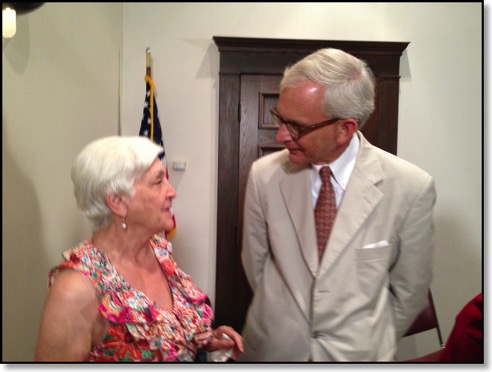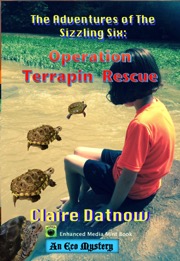YA Eco Mysteries, Memoirs, Novels & Travel
The Legacy of George Wallace
It was the best of times, it was the worst of times, it was the age of wisdom, it was the age of foolishness . . . it was the spring of hope, it was the winter of despair . . .
A Tale of Two Cities by Charles Dickens

Claire Datnow with Dr. Angela Lewis, professor of political science at UAB
Dickens could have written this in 1963 at the height of the Civil Rights Movement in Birmingham, Alabama. The events of that year revealed the best and worst that humans are capable of. Birmingham’s most courageous citizens fought to release their city from the terrible grip of hatred and discrimination, while the most bigoted citizens fought against freedom and justice. Now, 50 Years Forward, the city is coming together to commemorate “The Movement That Changed The World.”
I grew up in Johannesburg, South Africa at the height of Apartheid. In 1972 my family and I made Birmingham, Alabama our new home. At the time I wondered how life had brought me to these two cities marked by racial strife. The answer would only become clear many years later, but from the very beginning I felt that this ironic twist of fate was sending me a message—one that I needed to decipher.
More than forty years later, in 2011, the two halves of my life came together. I published my memoir of growing up under Apartheid, and the Birmingham Civil Rights Institute asked my husband and myself to help prepare Birmingham students for an exchange visit to Johannesburg, South Africa. It was truly gratifying to meet with our city’s students, and then later to celebrate the arrival of the students from Johannesburg, South Africa. Both groups observed that they were surprised by historical similarities between the Civil Rights struggle in the United States, and Freedom struggle to end Apartheid.
A few weeks later, I gave a gallery talk to introduce a traveling exhibit honoring Helen Suzman, South Africa’s Freedom Fighter, which opened at the Birmingham Civil Rights’ Institute. The first vote that I ever cast was for Helen Suzman, the lone Member of Parliament who spoke out courageously against apartheid for thirty-six years. A transformative experience proved to be the years I spent teaching in Birmingham Public Schools. There I saw first hand how integration had succeeded in bringing the races together; sadly, in the end, it has failed to produce the hoped for results—in part because of white flight.
This year, official Birmingham is embracing the anniversary of civil rights with museum exhibitions, concerts, plays, symposiums, festivals, workshops and the National Conference on Civil Rights. This week we attended a panel examining Governor George Wallace’s role in Birmingham’s civil rights struggle and Wallace’s continuing influence on American politics and race relations today. The event was generously support of the Rita C. Kimerling Family Fund.
The first panelist, historian Dr. Dan T. Carter, who wrote a biography of Wallace, posed the question: Why did Wallace behave the way he did in 1963? Was Wallace a racist at heart or ruthlessly using race to garner votes? No one can answer that for sure, but it is safe to say that he was a pragmatist and a wily politician. Despite his upcoming confrontation with President John F. Kennedy, Wallace repeated his intention to stand at the schoolhouse door to prevent desegregation, and then orchestrated the whole media event. Worse yet, he was extremely critical of leaders like Martin Luther King and Reverend Frederick Shuttlesworth. Although Wallace had no control over events in Birmingham, he stirred up hate and violence with his words and actions.
Dr. Carter concluded that there is a regrettable tendency to divide ourselves into “us” and “them.” This manifests itself in prejudice against people of different religions, races, nationalities, and creeds. In my own small way, through my writing I try to promote respect and understanding for those we view as different from ourselves. In my memoir, Growing Up Behind the Walled Garden of Apartheid, and my historical novel, The Nine Inheritors, I explore the two most significant historical events in my life—the Holocaust and Apartheid. Growing up in South Africa I was taught to perceive the world through the distorted lens of apartheid. Although much of what I was taught as a child has served me well in adulthood, there has also been a slow and difficult process of unlearning, of shedding the narrow, bigoted view of the world. Nevertheless, having grown up in South Africa at the height of Apartheid and lost members of my family in the Holocaust, the results of racial hatred are very real to me. I dedicated The Nine Inheritors, to the Jews from the village of Linkuva, Lithuania and to my grandmother Blume Klein, and my aunts Dora and Toibe Klein who were murdered in the Holocaust by the Nazis.
On a more positive note, Dr. Glenn T. Eskew, the second panelist, made a strong case for the fact that Wallace’s support of groups like the KKK only stirred up more violence, which exposed the depths of entrenched racial inequality. Ironically, happily the resulting turmoil paved the way for sweeping reforms and to the passing of the Civil Rights Act of 1964.

Claire Datnow with Dr. Glenn Eskew, author of But for Birmingham
Dr. Angela K. Lewis, the third panelists, pointed out that black voters are pragmatic. In 1982, a surprising number of blacks voted for Wallace because he returned to his populist roots as a supporter of the poor. In that election black voters choose the lesser of two evils as Wallace was running against a right wing conservative, hostile to blacks. Dr. Lewis contended that the code words and phrases used by Wallace that appeal to latent racism, are still circulated today, including law and order, tough on crime, and state’s rights. At the end of his life, Wallace asked the black leaders for their forgiveness. Dr. Carter suggested that they forgave him because many were “born again” Christians who believed in forgiveness. They forgave, Lewis said, but they did not forget.
How far has our city come fifty years after the struggle? On one level we have come a long way from the days of segregation that relegated blacks to certain neighborhoods, low-paying jobs, and allowed their children to only enroll in black schools. Yet cities in the Greater Birmingham Metropolitan area still tend to be tipped along racial lines. In the end it’s up to each one of us to find the courage to do something to make a difference—no matter how small. Let’s hope that the people of our city and our nation will honor the legacy of those who were part of the civil rights struggle by building a more just and peaceful society.
WANT TO SHARE OR COMMENT? Please click on the icons(s) of your favorite social media to share, or to comment.


